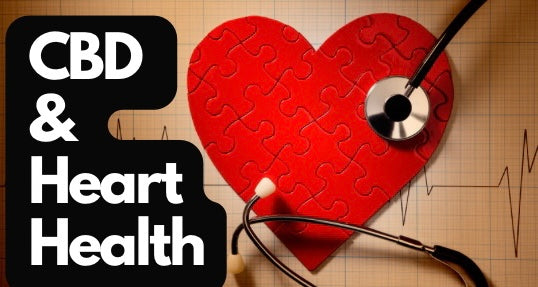
♥ CBD & Your Heart ♥

 Importance of Heart Health
Importance of Heart Health
The heart beats about 2.5 billion times over the average lifetime, pushing millions of gallons of blood to every part of the body. This steady flow carries with it oxygen, fuel, hormones, other compounds, and a host of essential cells. It also whisks away the waste products of metabolism. When the heart stops, essential functions fail, some almost instantly.
Although many people develop some form of cardiovascular disease (a catch-all term for all of the diseases affecting the heart and blood vessels) as they get older, it isn't inevitable. A healthy lifestyle, especially when started at a young age, goes a long way to preventing cardiovascular disease.
Given the heart's never-ending workload, it's a wonder it performs so well, for so long, for so many people. But it can also fail, brought down by a poor diet and lack of exercise, smoking, infection, unlucky genes, virus, chronic inflammation and more.
 Can COVID-19 Damage The Heart?
Can COVID-19 Damage The Heart?
Yes: Although COVID-19 is primarily a respiratory or lung disease, the heart can also suffer.
Temporary or lasting damage to heart tissue can be due to several factors:
Lack of Oxygen : As the virus causes inflammation and fluid to fill up the air sacs in the lungs, less oxygen can reach the bloodstream. The heart has to work harder to pump blood through the body, which can be dangerous in people with preexisting heart disease. The heart can fail from overwork, or insufficient oxygen can cause cell death and tissue damage in the heart and other organs.
Myocarditis: Inflammation of the Heart : The coronavirus may infect and damage the heart’s muscle tissue directly, as is possible with other viral infections, including some strains of the flu. The heart may also become damaged and inflamed indirectly by the body’s own immune system response.
Coronavirus infection also affects the inner surfaces of veins and arteries, which can cause blood vessel inflammation, damage to very small vessels and blood clots, all of which can compromise blood flow to the heart or other parts of the body. “Severe COVID-19 is a disease that affects endothelial cells, which form the lining of the blood vessels,” Post says.
Stress Cardiomyopathy : Viral infections can cause cardiomyopathy, a heart muscle disorder that affects the heart’s ability to pump blood effectively. When attacked by a virus, the body undergoes stress and releases a surge of chemicals called catecholamines, which can stun the heart. Once the infection resolves, the stressor has ended and the heart can recover.
 CBD and The Heart
CBD and The Heart
CBD’s anti-inflammatory and antioxidative properties may be able to reduce risk factors that can lead to heart disease, like high blood pressure. It may also be able to reduce the risk of related conditions, like stroke.
CBD and High Blood Pressure
High blood pressure is the leading risk factor for hypertensive heart disease. Your blood pressure can rise under stress, but some research suggests a dose of CBD can lessen that spike.
In a 2009 study, rats were subjected to a stressful situation that caused their blood pressure and heart rate to increase. A dose of CBD lowered both their blood pressure and heart rate.
In a 2017 study, healthy human volunteers were subjected to stress and then given a dose of CBD. The CBD lowered their blood pressure, as compared to volunteers given a placebo.
So, while more research is needed to say for sure, CBD may be useful in lowering blood pressure and heart rate under stress.
CBD and Strokes
Heart disease increases your risk of stroke. An ischemic stroke happens when a blood clot blocks blood flow to the brain. A blood vessel in the brain can also burst, causing a hemorrhagic stroke.
A 2010 review found that CBD may help protect stroke patients from brain damage and even aid recovery by boosting brain function.
A 2017 review also concluded that CBD increased cerebral blood flow during a stroke,
CBD and Inflammation
Inflammation, or the inflammatory response, is an aspect of the body’s immune response. While short-term inflammation can be protective, chronic inflammation is linked to several diseases, including heart disease, cancer, diabetes, rheumatoid arthritis, inflammatory bowel disease, and Alzheimer’s.
Inflammation often goes hand in hand with pain. The most common symptoms of inflammation include pain, heat, redness, and swelling. Typically, inflammation is treated with anti-inflammatory medications, including both non-steroidal anti-inflammatory drugs (NSAIDs) and steroid medications.
Such medications have risks and side effects, however. Some people choose to take a more preventative approach to treating inflammation, such as consuming an anti-inflammatory diet, and taking anti-inflammatory supplements.
Cannabinoids, including CBD, are believed to be anti-inflammatory. Several studies in cells, rodents, and humans support the idea that CBD may be an effective anti-inflammatory, but more research is needed to determine how it works and the best applications for specific types of inflammation.
Inflammation is a complicated process involving many signaling pathways. The body uses signaling molecules called eicosanoids to initiate the inflammatory response. One of the ways CBD can reduce inflammation is by inhibiting an eicosanoid enzyme called COX2. NSAID medications such as Advil and Aspirin also target COX2 in their method of action.
CBD also appears to affect a class of molecules important to the inflammation process called cytokines. CBD tends to reduce the effects of pro-inflammatory cytokines, thereby reducing inflammation.
 Why Choose 8Labs CBD?
Why Choose 8Labs CBD?

 Message from 8Labs Founder & CEO
Message from 8Labs Founder & CEO

"We know that our CBD works, but we understand why you might be hesitant. There is a lot of misinformation about CBD out there. Don't worry, we are here to help answer any questions you may have. Welcome to your CBD journey!"
-Erin Lorenzana
Our hemp has a unique chemical composition. It is extremely rich in CBD and other cannabinoids with less than 0.3% THC. Therefore, our products do not have any negative effects associated with marijuana and THC use. With 8LABS CBD, you receive all the positive benefits of hemp’s full spectrum of components, with absolutely zero psychoactive effects.
8LABS CBD products contain the full spectrum of cannabinoids including CBC, CBG, CBDA, CBN and others. Additionally, our extracts contain terpenes - organic hydrocarbons found in the essential oils of plants. Together CBD, other cannabinoids and terpenes all interact synergistically to create what scientists refer to as an “entourage effect” that magnifies the therapeutic benefits of the plant’s individual components—so that the medicinal impact of the whole plant is greater than the sum of its parts.
We have a strict quality control program including on site chromatography reviews and independent lab tests on each batch of product. These reports confirm that the components of hemp remain potent, completely undenatured, and fully active. We maintain high standards of purity and potency to deliver only the highest grade CBD.
ARTICLE SOURCES :
https://www.hopkinsmedicine.org/health/conditions-and-diseases/coronavirus/heart-problems-after-covid19
https://www.healthline.com/health/cbd-for-heart-disease#research
https://www.health.harvard.edu/topics/heart-health
https://www.leafly.com/news/health/cbd-for-inflammation-science
